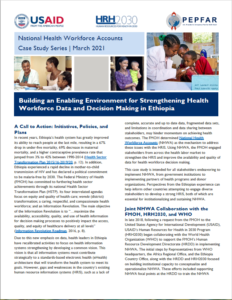30 Mar Case Study: Building an Enabling Environment for Strengthening Health Workforce Data and Decision Making in Ethiopia
Ethiopia launched its Information Revolution agenda in 2016, which focuses on maximizing the availability, accessibility, quality, and use of health information to strengthen healthcare delivery and improve health outcomes. However, gaps and weaknesses in the country’s existing human resource information systems (HRIS) is hindering momentum on attaining these outcomes. The Federal Ministry of Health (FMOH) has identified the World Health Organization’s National Health Workforce Accounts (NHWA)as the strategic mechanism to address these issues and to improve overall decision making.
HRH2030 has been working with the FMOH’s Human Resources Development Directorate (HRDD) and USAID Ethiopia to address weaknesses in the HRIS and develop processes for NHWA implementation. This concise, six-page study examines how the FMOH engaged stakeholders from across the health labor market to prioritize information needs, created a NHWA governance structure, and began working on revitalizing its HRIS to overcome the barriers to collecting and using quality data.
Key takeaway: Ethiopia’s approach to fully integrate NHWA activities into HRDD operations has been an important sustainability strategy. The country’s strong policy environment reinforced the HRDD’s ability to effectively conceptualize and operationalize NHWA, particularly in terms of engaging key stakeholders and improving the availability and use of quality data. Moving forward, the FMOH is committed to building on the current investments in this initiative and further institutionalizing NHWA.
Associated Content:
Country Snapshot: HRH2030 in Ethiopia
Webinar: Building a Dynamic Ecosystem of Health Workforce Data to Achieve the SDGs
Blog: The Future We Want: Increased Investment in National Health Workforce Accounts
Country: Ethiopia
Resource Type: Case Study, Other
Topic: HRIS and health workforce data; Leadership and governance
DOWNLOAD






